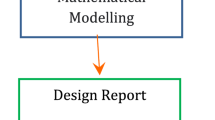Abstract
As 3D printing technology transforms product design and manufacturing, educational programs must incorporate its principles to prepare engineering students for the workforce. Establishing dedicated labs and integrating 3D printing into higher education curricula has become popular among universities and colleges. However, insufficient attention is paid to using this learning practice to apply knowledge of engineering fundamentals and develop skills for implementing efficient and reliable additive manufacturing processes. Therefore, new approaches are needed to increase the pedagogical value of this learning practice. This study explores the effectiveness of the project-based learning (PBL) approach for enhancing the understanding of mathematical, engineering, and 3D printing concepts and their application by mechanical engineering students. We developed a pilot course, “Engineering and mathematical applications in 3D printing,” for junior and senior-year students. The course included lectures on design for additive manufacturing (DfAM), 3D printing technologies, printability, and troubleshooting, as well as project tasks involving the design and fabrication of functional objects such as asymmetric spinning-tops, Pythagorean cups, and print-in-place mechanisms. In the study, we examined how participants applied their mathematical and engineering knowledge to solve complex design challenges using 3D printing technology, and their perceptions of the learning experience. Using an exploratory research design, data were collected through observations, student works, and post-course questionnaires. The findings indicate that the students successfully completed the project tasks, demonstrating their ability to apply engineering principles and optimize designs for 3D printing. The students highly appreciated the course’s project-oriented format and its contribution to their understanding of 3D printing.
Access this chapter
Tax calculation will be finalised at checkout
Purchases are for personal use only
Similar content being viewed by others
References
Cabaleiro-Cerviño, G., Vera, C.: The impact of educational technologies in higher education. GIST – Educ. Learn. Res. J. 20, 151–169 (2020)
Eisazadeh, H., Torabizadeh, M.: Expanding a mechanical engineering technology curriculum to include additive manufacturing. In: 2021 ASEE Virtual Annual Conference (2021)
Ford, S., Minshall, T.: Where and how 3D printing is used in teaching and education. Addit. Manuf. 25, 131–150 (2019)
Machado-Toledo, J., Mora, C.E., Añorbe-Díaz, B., González-Marrero, A., Martín-Gutiérrez, J.: Project-oriented problem-based learning for an entrepreneurial vision in engineering education. In: Zaphiris, P., Ioannou, A. (eds.) Learning and Collaboration Technologies. Learning and Teaching. Lecture Notes in Computer Science, vol. 10925, pp. 483–491. Springer, Cham (2018). https://doi.org/10.1007/978-3-319-91152-6_37
Levin, L., Verner, I.: Student practice in 3D design and printing for promoting analytical and applied mathematical thinking skills. Int. J. Eng. Pedagogy 11, 39–53 (2021)
Grebski, M., Grebski, W.: Project-based approach to engineering technology education. Prod. Eng. Arch. 25, 56–59 (2019)
Ullah, A.S., Tashi, Kubo, A., Harib, K.H.: Tutorials for integrating 3D printing in engineering curricula. Educ. Sci. 10, 194 (2020)
Go, J., Hart, A.J.: A framework for teaching the fundamentals of additive manufacturing and enabling rapid innovation. Addit. Manuf. 10, 76–87 (2016)
Powar, K.P., Patil, S.D.: Promoting technology-enhanced project-based learning through application of 3D printing technology for mechanical engineering education. J. Eng. Educ. Transform. 35, 292–329 (2022)
Mo, J.P.T., Tang, Y.M.: Project-based learning of systems engineering V model with the support of 3D printing. Australas. J. Eng. Educ. 22, 3–13 (2017)
Cuperman, D., Verner, I.M., Levin, L., Greenholts, M., Rosen, U.: Focusing a technology teacher education course on collaborative cloud-based design with Onshape. In: Auer, M.E., Hortsch, H., Michler, O., Köhler, T. (eds.) Mobility for Smart Cities and Regional Development - Challenges for Higher Education. Lecture Notes in Networks and Systems, vol. 390, pp. 465–477. Springer, Cham (2022). https://doi.org/10.1007/978-3-030-93907-6_49
Serdar, T.: Educational challenges in design for additive manufacturing. In: ASEE Annual Conference and Exposition. American Society for Engineering Education (2016)
Bächer, M., Whiting, E., Bickel, B., Sorkine-Hornung, O.: Spin-It: optimizing moment of inertia for spinnable objects. ACM Trans. Graph. (TOG) 33, 1–10 (2014)
Akiyama, J., Sato, I., Seong, H.: Tessellabilities, Reversibilities, and Decomposabilities of Polytopes. In: Nielsen, F., Barbaresco, F. (eds.) Geometric Science of Information, pp. 215–223. Springer, Berlin Heidelberg, Berlin, Heidelberg (2013)
Ponelis, S.R.: Using interpretive qualitative case studies for exploratory research in doctoral studies: a case of information systems research in small and medium enterprises. Int. J. Dr. Stud. 10, 535–550 (2015)
Acknowledgement
This research was supported by the Technion Additive Manufacturing Center Dissemination Project Grant.
Author information
Authors and Affiliations
Corresponding author
Editor information
Editors and Affiliations
Rights and permissions
Copyright information
© 2024 The Author(s), under exclusive license to Springer Nature Switzerland AG
About this paper
Cite this paper
Levin, L., Verner, I. (2024). Practicing the Engineering Fundamentals in a Project-Based Design and 3D Printing Course. In: Auer, M.E., Cukierman, U.R., Vendrell Vidal, E., Tovar Caro, E. (eds) Towards a Hybrid, Flexible and Socially Engaged Higher Education. ICL 2023. Lecture Notes in Networks and Systems, vol 901. Springer, Cham. https://doi.org/10.1007/978-3-031-53022-7_17
Download citation
DOI: https://doi.org/10.1007/978-3-031-53022-7_17
Published:
Publisher Name: Springer, Cham
Print ISBN: 978-3-031-53021-0
Online ISBN: 978-3-031-53022-7
eBook Packages: Intelligent Technologies and RoboticsIntelligent Technologies and Robotics (R0)




